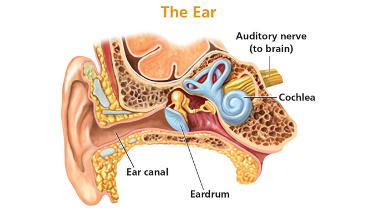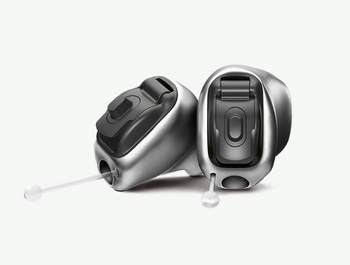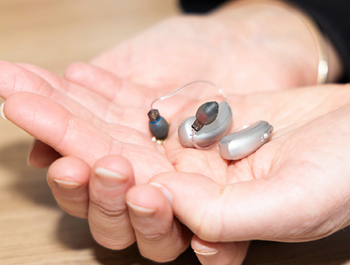Tinnitus symptoms & treatments
22 February 2022
Tinnitus is usually defined as the sensation of hearing sounds when no sound is present. It is a common symptom experienced by 10-15% of the population, with about 8% seeking advice from their GP or Audiologist. It can affect one or both ears and start very suddenly or gradually intensify. The sounds can stay there all the time or come and go, varying in loudness, pitch and intensity.
What is Tinnitus?
Tinnitus can be described as an irregular neural activity and usually originates in the inner ear (cochlea), brainstem or central nervous system. In almost all cases, tinnitus is caused by the brain’s response to change. Tinnitus is the brain’s reaction to reduced neural stimulation with hearing loss. Here, instead of the ear delivering sound to the nerve, the neural fibres are left under-stimulated and begin to create spontaneous activity. The effect may sound like a seashell or cicada, but may also be described as a buzzing, roaring, clicking, booming, hissing or whistling sound.

Tinnitus causes
Tinnitus can be caused by virtually anything that provokes hearing loss, including;
- Ageing
- Living or working around loud noises
- Ear infections
- Eardrum rupture
- Stress or anxiety
- Medicines such as aspirin
- Drinking an excessive amount of alcohol
- Problems with the temporomandibular joint (TMJ) (the joint that connects your jaw with your skull)
- Head, neck or ear injuries
- Spasms in certain muscles
- Radiation therapy to your head or neck
- Severe weight loss from malnutrition or excessive dieting
- Repeated exercise with your neck in a hyperextended position (such as when cycling)
- Diabetes
- Meniere’s disease
- Autoimmune conditions
- Blood flow problems
- High blood pressure (hypertension)
- Tumours, particularly acoustic neuroma.
Tinnitus affects and habituation
It is important to separate the perception around tinnitus and the individual’s reaction to it. Although most people who experience tinnitus are not unduly bothered by the causes, some may find a marked difference in their quality of life. In some cases, tinnitus can affect hearing ability, sleep, concentration and overall enjoyment of activities. However, tinnitus can (and usually does) improve over time, getting less annoying as the brain ‘loses interest’ in the sensation. In some cases, tinnitus will completely disappear. This process is called habituation, but the length of time it takes to occur will likely vary between individuals.
Tinnitus treatment
Although most tinnitus cases cannot be helped by surgery or medication, other treatment options are available to help manage tinnitus and achieve habituation. Every tinnitus case is unique and needs to be handled as such.
Here is a list of different forms of management available:
- Information/education - A detailed explanation of tinnitus, together with the reassurance that the tinnitus will improve, can be hugely beneficial and reassuring. Tinnitus does spontaneously decrease over time in many cases.
- Hearing aids - Correcting even a mild hearing loss can be helpful because it brings to your ears sounds they may not otherwise detect. Hearing aids make the tinnitus less audible and remove the strain from attempting to hear, often reversing tinnitus-related changes in the brain. Sometimes an adjustable sound generator in the hearing aid can also be used to good effect.
- Counselling - Addressing underlying worries and concerns can be effective whilst getting support for your tinnitus. A qualified audiologist is well placed to offer this appointment.
- Physiotherapy - In some cases, manipulation of the cervical spine by a qualified Physio can help. In instances where a clicking sound is heard in the ear, Tonic Tensor Tympani Syndrome is often the cause and can possibly be helped through Physio appointments.
- Relaxation and sleep management - Many people find that their tinnitus is worse when they are stressed or not sleeping well but better when relaxed. Relaxation techniques could involve controlled breathing, exercise and meditation.
- Sound enrichment therapy - The use of sound, either through desk-top devices or hearing aids, can help reduce tinnitus perception and promote habituation. We recommend the Beltone Tinnitus calmer app as a helpful sound generating tool to manage tinnitus.
- Psychological support - Support may be offered to help people with tinnitus deal with accompanying feelings of anxiety and depression.
- Medication - Some people may benefit from medication, such as anti-anxiety medication, anti-depressants or sleeping tablets for other conditions they have in addition to their tinnitus. However, there is no specific medication for tinnitus.
Useful links
- British Tinnitus Association: https://www.tinnitus.org.uk/
- (Adapted from the British Tinnitus Association website): https://www.tinnitus.org.uk/pages/category/information-leaflets)
- Tinnitus Australia: https://www.tinnitusaustralia.org.au/
- Health Navigator New Zealand: https://www.healthnavigator.org.nz/health-a-z/t/tinnitus/




